This report was developed by the North America coordinators of the Coalition Against the Mining Pandemic.
Analyzing the mining industry’s operations in North America over the course of the COVID-19 pandemic, its goal is to highlight the social and environmental impacts of these operations, with a particular focus on regulatory changes and on how mining during the pandemic has affected communities and workers.
The core findings of this regional report are as follows:
- The COVID-19 pandemic has fueled a significant deepening of racist and colonial power asymmetries between mining companies and communities, giving mining companies new opportunities to push through unpopular projects by violating and rolling back environmental protections. Companies’ actions are bolstered by direct and indirect support from governments, who have often been active partners in perpetuating this violence. Governments have ignored their government-to-government obligations to Indigenous peoples under treaties, the UN Declaration on the Rights of Indigenous Peoples (UNDRIP), negotiated agreements, or (in the case of Canada) the Canadian Constitution.
- States and companies have worked together to make sure mining continues throughout the pandemic, creating significant and unnecessary health risks for workers and communities alike.
- The pandemic has provided a window of opportunity for companies and governments to further entrench the mining sector in the public consciousness by arguing that the sector is key to post-pandemic economic recovery. In several cases, these arguments are built on the tenuous claim that mined minerals will contribute to the “green transition”.
- Community resistance has persisted despite the additional barriers posed by the pandemic. This resistance has secured some significant wins, including improvements to companies’ health and safety protocols.



